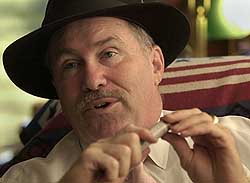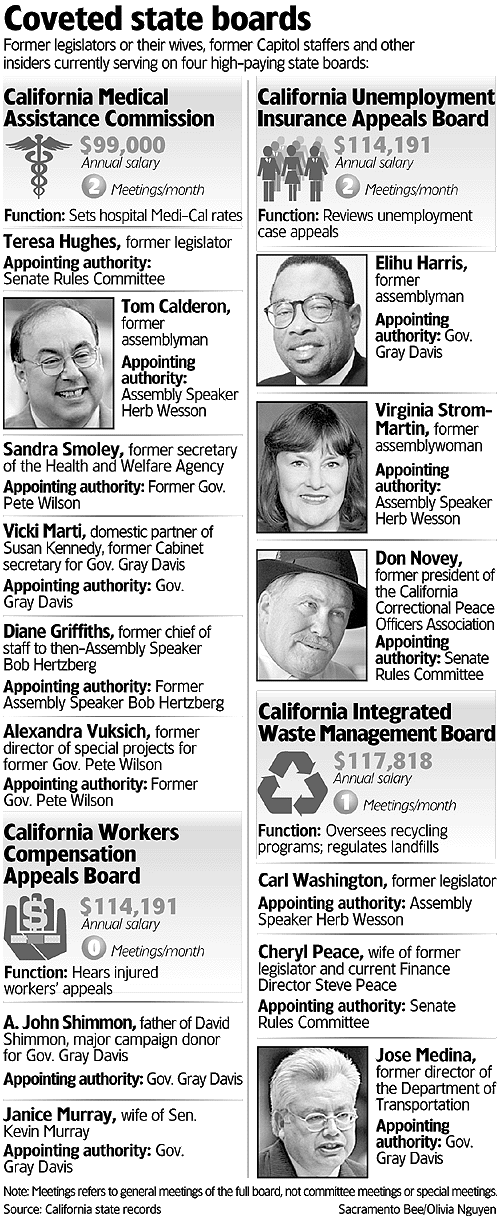|
|
|
 Don Novey, former
leader of a union that raised $3 million for candidates and
causes last year, now makes $114,191 a year on a state board.
Don Novey, former
leader of a union that raised $3 million for candidates and
causes last year, now makes $114,191 a year on a state board.
Sacramento Bee file,
2002/Randy Pench | |
|
Political insiders land plum posts
For six figures, they serve on panels that seldom meet, get little
oversight.
By Jim Sanders -- Bee Capitol Bureau
Published 2:15 a.m. PST
Sunday, March 9, 2003
Don Novey, once one of the people
legislators feared most, now earns more than $114,000 per year as a
political appointee.
Tom Calderon, a former assemblyman, landed a $99,000-per-year post from
his good buddy and former colleague, Assembly Speaker Herb Wesson.
Cheryl Peace, wife of former senator and current state Finance Director
Steve Peace, can pocket nearly $118,000 this year for sitting on the waste
management board.
Add their names to a long list of politicians, legislative staffers and
Capitol insiders who have nabbed appointments in recent years to a handful
of lucrative boards that typically meet once or twice a month and pay
salaries in the $100,000 range.
California's network of boards and commissions has grown piecemeal
through the years with little uniformity or consistency: Members of the
education board are paid just $100 per meeting to decide key academic
issues, for example, while members of the waste board earn $118,000 per
year to oversee trash disposal.
Some of the highest-paying panels tend to receive a disproportionate
share of insiders. Since it became a full-time board in 1990, for example,
the lucrative waste panel has had four former legislators, three wives of
former legislators and numerous former high-ranking state officials or key
staffers.
"Let's stop the political payback," said Assemblyman Tony Strickland,
R-Moorpark. "With this budget deficit, we have an opportunity to stop and
ask, 'What are California's priorities?' We need to go after everything we
can find."
Senate President Pro Tem John Burton, who chairs the Rules Committee
that chose Peace and Novey, said appointing people who know state
government and can get things done -- whether Capitol insiders or not --
serves the public interest.
"You appoint people who are qualified and able to do the job," Burton
said.
Support is growing in the Legislature for a board-by-board analysis of
cost-effectiveness. Cutting panels would not necessarily ease California's
budget crisis, however, because they represent only a tiny fraction of
state spending, and some of the highest-paying boards are funded through
fees or other dedicated revenue sources.
Proponents say boards and commissions provide a valuable service by
expanding decision-making beyond the realm of department heads or
technical experts. Boards are designed to ensure a diversity of viewpoints
and public input before decisions are made on critical issues -- from
water to garbage to air pollution -- that affect every Californian.
But lawmakers have provided little oversight over many appointed
boards, so Californians who pay the bills have no idea whether members are
working hard, serving effectively -- or just biding their time and
collecting a huge paycheck.
The state's most lucrative commissions range from the powerful to the
obscure, from policy-making bodies to quasi-judicial agencies, from the
Public Utilities Commission or the Energy Commission to the Unemployment
Insurance Appeals Board.
Four high-paying boards on which legislators or Capitol insiders have
served are the Integrated Waste Management Board, the Medical Assistance
Commission, the Unemployment Insurance Appeals Board and the Workers'
Compensation Appeals Board.
Current members of the four boards include former legislators Calderon,
Teresa Hughes, Carl Washington, Elihu Harris and Virginia Strom-Martin;
several former state officials or key staffers; and two politicians'
spouses -- Peace and Janice Murray, wife of Sen. Kevin Murray, D-Culver
City.
Novey, a member of the Unemployment Insurance Appeals Board, formerly
served as president of the powerful California Correctional Peace Officers
Association, which contributed more than $3 million to political
candidates and causes last year.
A recent appointee to one of the four boards was A. John Shimmon, 79,
named to the workers' compensation panel by Gov. Gray Davis last month, a
position that pays $114,191. Shimmon is a former Board of Equalization
employee and the father of Silicon Valley executive David Shimmon, who has
donated $350,000 to Davis over the past two years.
Public records provide little help in determining how hard appointees
of the four boards work or how effective they are. Time spent in board
meetings tends to be minimal.
Minutes of the California Medical Assistance Commission, whose members
earn $99,000, show that none of their twice-monthly meetings lasted longer
than three hours last year -- and six of the sessions ended within 90
minutes, including closed-door contract talks.
Sandra Smoley, who chairs the commission, said the bulk of the work
occurs behind the scenes -- reading reports, making phone calls and laying
the groundwork to negotiate contracts for Medi-Cal hospital in-patient
rates and other such matters.
"(Billions) have been saved because of what we do. I think you have to
look beyond salary. ... If the state didn't have this commission, it would
be a big negative for taxpayers, both at the state and federal levels,"
said Smoley, a former secretary of the Health and Welfare Agency who was
appointed to the commission by former Gov. Pete Wilson.
Smoley and Calderon, colleagues on the commission, say they spend at
least 10 hours a week on commission business. In their spare time, they
supplement their $99,000 state salary by providing consulting services.
The Unemployment Insurance Appeals Board, like the Medical Assistance
Commission, conducts its heaviest lifting outside public meetings. Minutes
show that only six issues sparked board votes last year -- and five of the
tallies were unanimous.
"Meetings are almost incidental to the work of the board," said Harris,
a former assemblyman and current board member.
The primary job of the board, which pays $114,191 per year, is to
consider appeals from decisions of administrative law judges.
Novey said he spends roughly six to seven hours per day, sometimes
more, reviewing 20 to 25 legal decisions -- a pace that breaks down to
roughly three cases per hour.
The board keeps no statistics on how often board members modify, reject
or rubber-stamp staff recommendations.
Novey said he thinks Burton considered him for the appointment, in
part, because he helped the senator win the pro tem post years ago.
"He was very loyal that I stood behind him," Novey said. "I think he's
never forgotten that."
Members of the California Integrated Waste Management Board, which
oversees recyling and other trash-related programs, say they routinely
exceed a 40-hour workweek, though the board typically holds just one
all-day session each month and four committee meetings averaging about
three hours each.
Chairwoman Linda Moulton-Patterson and other waste board members said
they routinely average between 45 and 60 hours per week on recycling,
waste diversion, tire disposal and numerous other landfill or
trash-related issues.
"I think it would be disingenuous not to give the public what they pay
for," said Steven R. Jones, who earns $117,818 as the waste industry's
representative on the panel. "I don't know of any board members who take
advantage."
From its inception, however, the waste board has been a lightning rod
for cronyism. Former Gov. George Deukmejian named Chief of Staff Michael
Frost and state Finance Director Jesse Huff to the board just days before
leaving office in January 1991. They joined the wife of then-Assemblyman
Harris, Kathy Neal, who was appointed by Willie Brown, the Assembly
speaker at the time and a longtime ally of Harris.
Bob Stern, president of the Center for Governmental Studies in Los
Angeles, said the key issue is not whether boards contribute something
positive to state government -- some are vital.
"You just don't need to pay appointees $100,000," Stern said. "How many
legislators have been appointed to boards that pay little? None."
Assemblyman Ray Haynes, R-Murrieta, said termed-out legislators "fight,
bite and scratch" for plum appointments.
Haynes said a senator once approached him, in the mid-1990s, and
confided that "I like your bill, it's a fine bill, but if I gave you my
vote, it would cost me my appointment. And I'm not willing to do that."
Strickland has proposed legislation, AB 556, that would slice pay for
serving on 14 lucrative boards to $100 per meeting through 2006.
"We have people showing up once a month and making $118,000 a year,"
Strickland said. "Let's put that in perspective: Police officers show up
every day, put their lives on the line and they don't make that much
money."
With Democrats controlling the Governor's Office and both houses of the
Legislature -- enabling party leaders to make key board appointments --
Strickland's bill faces an uphill struggle.
Sen. Ross Johnson, R-Irvine, has introduced a bill to cap, but not
eliminate, the salaries of high-paying board members.
Democrats are eyeing alternative measures: For the first time in nearly
a decade, a Senate committee is planning to evaluate the
cost-effectiveness of numerous boards and commissions, starting with small
advisory ones, later this year.
Sen. Jackie Speier, a Hillsborough Democrat who will lead the effort,
said the goal is to eliminate some of the more than 200 panels that
consume public funds. Many are voluntary but use paid staff. Speier said
she does not know whether the effort will extend this year to high-paying
boards.
Meanwhile, Davis has asked all appointees earning more than $60,000 to
accept a voluntary 5 percent pay cut, effective at the end of March.
Sen. Wes Chesbro, chairman of the Senate Budget Committee, said
potential savings from eliminating boards wouldn't dent the state's
massive budget shortfall -- but a board-by-board review is important
nonetheless, the Arcata Democrat said.
"If we can't demonstrate that we've reduced the bureaucracy and
overhead of government, we can't justify cuts in services or (higher)
taxes," Chesbro said. "We've got to do that first."
About the
Writer---------------------------
The Bee's Jim Sanders can
be reached at (916) 326-5538 or
jsanders@sacbee.com.



